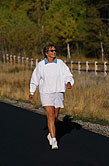- 8 Ways to Increase Dopamine Naturally
- 7 Best Breads for Maintaining Stable Blood Sugar
- Gelatin vs. Collagen: Which is Best for Skin, Nails, and Joints?
- The Long-Term Effects of Daily Turmeric Supplements on Liver Health
- Could Your Grocery Store Meat Be Causing Recurring UTIs?
- Are You Making This Expensive Thermostat Error This Winter?
- Recognizing the Signs of Hypothyroidism
- 10 Strategies to Overcome Insomnia
- Could Artificial Sweeteners Be Aging the Brain Faster?
- Techniques for Soothing Your Nervous System
Just 12 Percent of Women Over 50 Are ‘Satisfied’ With Their Bodies


TUESDAY, Oct. 22Be it muffin tops, saddlebags, chicken wings or thunder thighs, there’s a lot that most women can find to dislike about their bodies.
A recent survey of 1,700 women over age 50 found that a paltry 12 percent said they were satisfied with their size and shape. So researchers wondered what these rare women who actually feel OK with their bodies might have in common. The new study was published online recently in the Journal of Women & Aging.
For starters, most of them, 88 percent, were in the normal weight range. Their average body-mass index (BMI) was 21.4, compared with a BMI of 28.3 for women who reported dissatisfaction. (BMI is a measurement of body fat that takes height and weight into account.) And they were more likely to have been slender over the course of their lives than women who said they didn’t like how they looked.
The survey also found that satisfied women work hard to stay slim. They exercised an average of about five hours a week, about two more hours than women who said they disliked their figures. They also weighed themselves often, at least a couple of times a week.
“This is an active, effortful process for them,” said study co-author Cristin Runfola, a postdoctoral research fellow at the UNC Center for Excellence for Eating Disorders, at the University of North Carolina, in Chapel Hill.
But there were some things that satisfied women generally didn’t worry about. Only 10 percent reported frequent dieting in the last five years, compared with 39 percent of dissatisfied women. They were also less likely to have symptoms of an eating disorder than those who were frustrated with their weight.
But the peace they’d come to about their bodies seemed to be a fragile one.
“Even the women who were satisfied said their weight and shape played a pretty prominent role in how they felt about themselves,” Runfola said.
About 40 percent of satisfied women admitted that a 5-pound weight gain would make them moderately to extremely upset. And more than 50 percent of satisfied women confessed that they still didn’t like their stomach or face. More than 70 percent said they didn’t like their skin.
None of this surprised Joan Chrisler, a professor of psychology at Connecticut College, in New London. Chrisler has spent her career researching and thinking about the psychology of weight and eating disorders in women.
“Studies have shown that kindergarteners already know that they shouldn’t like fat children or want to be friends with them. They know in first grade already what it means to be on a diet. So why should we be surprised that women in their 50s are not satisfied with their bodies?” she asked.
When Chrisler lectures to women’s groups about how to feel better in their own skin, she offers the following tips.
Focus on health, not on weight. Eat a variety of foods, exercise and get enough sleep. Have a massage from time to time. Moisturize your skin. Wear clothes that fit. “A lot of women are not nice to themselves because they’re disappointed in their bodies,” she said.
Watch more foreign movies. “If you watch films from France and Japan, you’ll see many more older women than you see in U.S. movies, and they’re not all skinny as rails,” she said.
Avoid fashion magazines. “They’re full of young women and they’re wearing clothes that don’t look good on older women. They’re not made for us,” Chrisler said.
Don’t consider it a personal failure if the jeans you wore in high school don’t fit you in your 50s. “Women do gain weight at each reproductive milestone,” she said. “We gain weight at menarche, with the birth of each child and we gain weight at menopause, so we’re not going to have the same body size and shape at 50 as we had at 20. And if we don’t expect that, that would be a help.”
More information
For more tips on developing a positive body image, head to the U.S. Office on Women’s Health.
Source: HealthDay
Copyright © 2026 HealthDay. All rights reserved.










